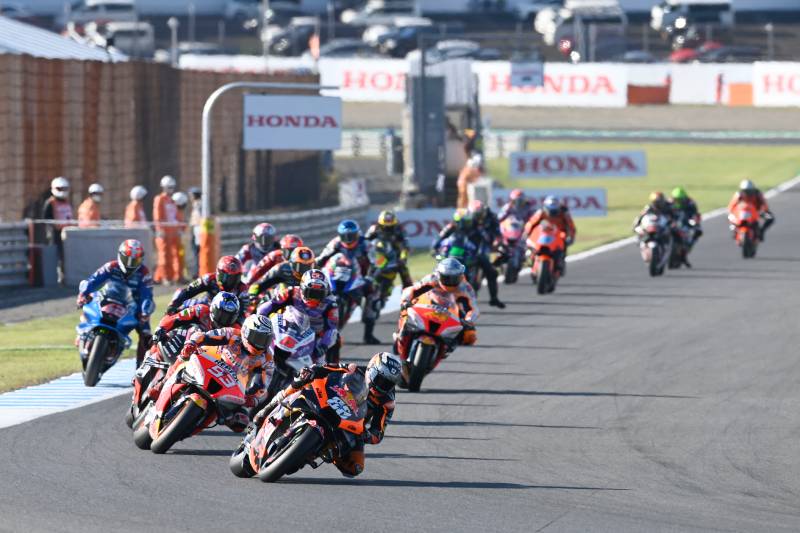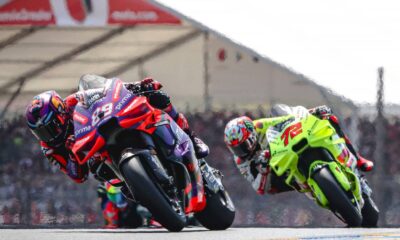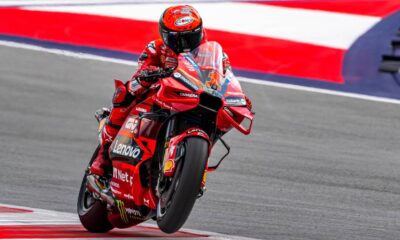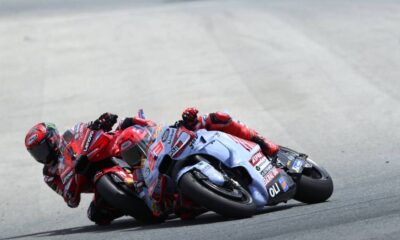Motorsport
A revolutionary new MotoGP season is about to begin! Who will take on the Italian guns of Ducati and Pecco Bagnai?
The 75th edition of the MotoGP series starts this weekend in an unusual way in Europe, in Portimao, Portugal. What can we expect from this groundbreaking season?

The 75th edition of the MotoGP series starts this weekend in an unusual way in Europe, in Portimao, Portugal. What can we expect from this groundbreaking season? How will the riders and teams cope with the newly introduced sprint races? Who, besides reigning champions Ducati and Francesco “Pecco” Bagnaiy, are the biggest contenders for the world championship?
Fans of the fastest riders on two wheels are just days away from the start of the next edition of the MotoGP series, with 22 riders and 11 teams competing over a record 21 weekends.
For the first time, the World Championship circus will visit the exotic destinations of India and Kazakhstan. And for the first time, we can also look forward to a double portion of races! In the following paragraphs, let’s take a look at who will be taking part this season and what changes are in store for each Grand Prix.
However, before we get into introducing this season, let’s take a quick look at what all happened last season.
MotoGP in 2022
The 2022 season saw the second part of the championship battle between Francesco ‘Pecca’ Bagnaia on a Ducati and then reigning World Champion Fabio Quartara riding for the factory Yamaha. The latter began his journey to defend his crown in fine style.
He finished the first four races in the second half of the elite ten. However, the Frenchman’s form picked up with the start of his European tour, and in the next six races he triumphed three times and stood on the podium five times.
Bagnaia, on the other hand, had a horrific first half of the season. He failed to finish four times and, despite winning in Spain and Italy, he was 91 points behind Quartara after the German Grand Prix (the 10th race of the season out of 20 – ed.).
But in the second half of the season, the momentum turned upside down. Bagnaia had won four Grand Prix in a row since the Dutch Tourist Trophy and Ducati extended that streak to six straight triumphs thanks to Eneo Bastianini and Jack Miller.
Other riders and factories, including Quartara and Yamaha, were no longer able to keep up with the pace of the Italian constructor and the Nice native lost his near 100-point lead after the Australian VC, with three races to go.
Although the title was not finally decided until the final Grand Prix in Valencia, Bagnai’s lead over Quartara was 23 points. The miracle of Quartara’s victory and Bagnai’s withdrawal did not happen. The Italian thus became the second Ducati World Champion after Casey Stoner in 2007.
Presentation of the constructors and riders
With Suzuki’s departure, a total of five factories remain in MotoGP – Ducati, Yamaha, Honda, Aprilia and KTM.
Ducati, like last year, will field eight motorcycles this year. The factory GP23 Desmosedici machines will be ridden by Italians Bagnaia and Bastianini for the Ducati Lenovo Team and Johann Zarco and Jorge Martin for the satellite Pramac.
The Gresini (Fabio di Giannantonio, Alex Márquez) and Mooney VR46 (Luca Marini, Marco Bezzecchi) teams will get last year’s machines. However, the all-round performance superiority of the Ducati machines over the others should allow all eight riders to take positions in the top half of the starting field.
Yamaha will have to make do with just two factory bikes this year, ridden by Fabio Quartararo and Franco Morbidelli, who faces the prospect of being finished with the factory team if his below-average performance last year is repeated this year. The Japanese mainstream factory lacked performance on the straights last season, but fortunately for them pre-season testing suggests they should match Ducati in those aspects at least.
Honda will deploy four machines again. Factory Repsol Honda will attack a return to the front with eight-time champion Marc Márquez and Joan Miró, who managed to find a commitment in the series after leaving Suzuki, with whom he won the 2020 world title. Satellite LCR retained Japan’s Takaaki Nakagami while acquiring Alex Rins, who like Mir was in danger of not finding a seat after Suzuki’s departure from MotoGP.
Given their form last season,Aprilia have great potential to complicate Ducati’s path to more titles. Taking over the RNF team (Raúl Fernández, Miguel Oliveira) from Yamaha, the Italian marque will have four machines in the premier class for the first time in its history.
Factory riders Aleix Espargaró and Maverick Viñales posted solid times in pre-season testing. Experts and commentators are predicting Aprilia as the second best constructor behind Ducati based on these times.
KTM has transformed its rider line-up the most compared to everyone else. Only factory rider Brad Binder has kept his place, and this year he will be measured against Australian Jack Miller. Satellite Tech3 (Augusto Fernández, Pol Espargaró) has partnered with constructor GasGas, under which name they will participate this season. However, GasGas does not own the machine concept, so it will receive championship points under KTM.
Sprints and other rule changes
This season will bring the biggest transformation to the race weekend in the history of the sport. In addition to the main race on Sunday, there will also be sprint races along the lines of Formula 1 or the World Superbike Championship! With the introduction of sprints, Dorna and the International Motorcycle Federation (FIM) are promising greater TV and on-site viewership.
The length of the individual sprints, which will be programmed every Saturday at 15:00 local time, is approximately half the total distance of Sunday’s Grand Prix. The top 9 riders will receive championship points for the sprints on a scale of 12-9-7-6-5-4-3-2-1. More racing, however, is taking a toll with the cancellation of the fourth free practice session and the rescheduling of qualifying runs to the morning local time. The aforementioned qualifying session will then determine the grid order for both the sprint and the Grand Prix itself.
For the companion Moto2 and Moto3 categories, neither the number of practice sessions nor the method of qualifying will change. However, the warm-up, which in the case of MotoGP is only measured at ten minutes, will be dropped for both classes. The last major change to the format of the grand prix weekend is the unification of the order of the individual races. The Moto3 race will always go first, followed by Moto2 with Filip Salac and the weekend will conclude with the MotoGP grand prix.
As for the changes in the technical regulations, teams will be required to maintain a minimum pressure in both tyres. This comes after uncertainty during last year’s race, when it was suspected that some teams were deliberately correcting tyre pressures for higher performance. In the end, the FIM ordered a ban on the free adjustment of the front ground clearance of motorcycles while riding. Teams are still allowed to work with the ground clearance at the rear of the machine.
In the attached Twitter post below, you can see the calendar for this year’s MotoGP season. Counting all four categories that will be featured during the year (MotoE, Moto3, Moto2 and MotoGP), the 2023 edition will offer 100 races! There will be no shortage of dramatic and breathtaking spectacle.
Source: MotoGP






